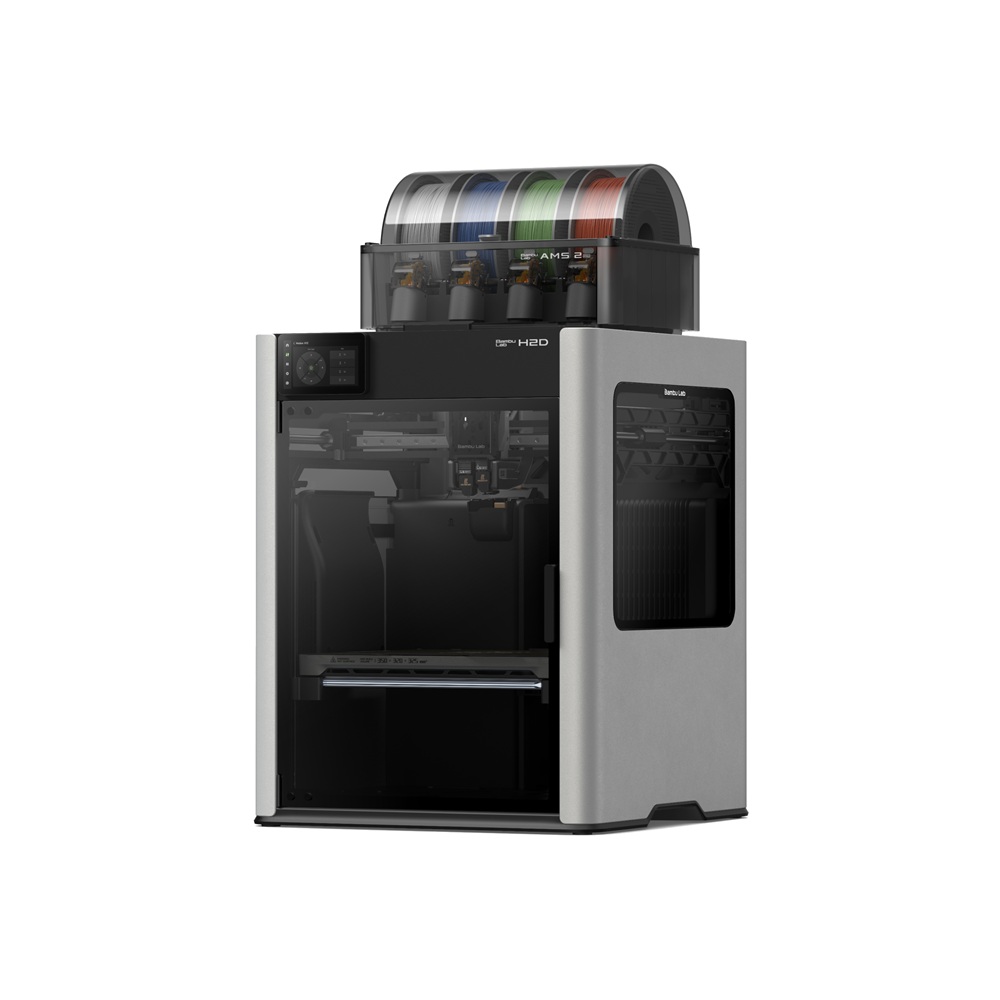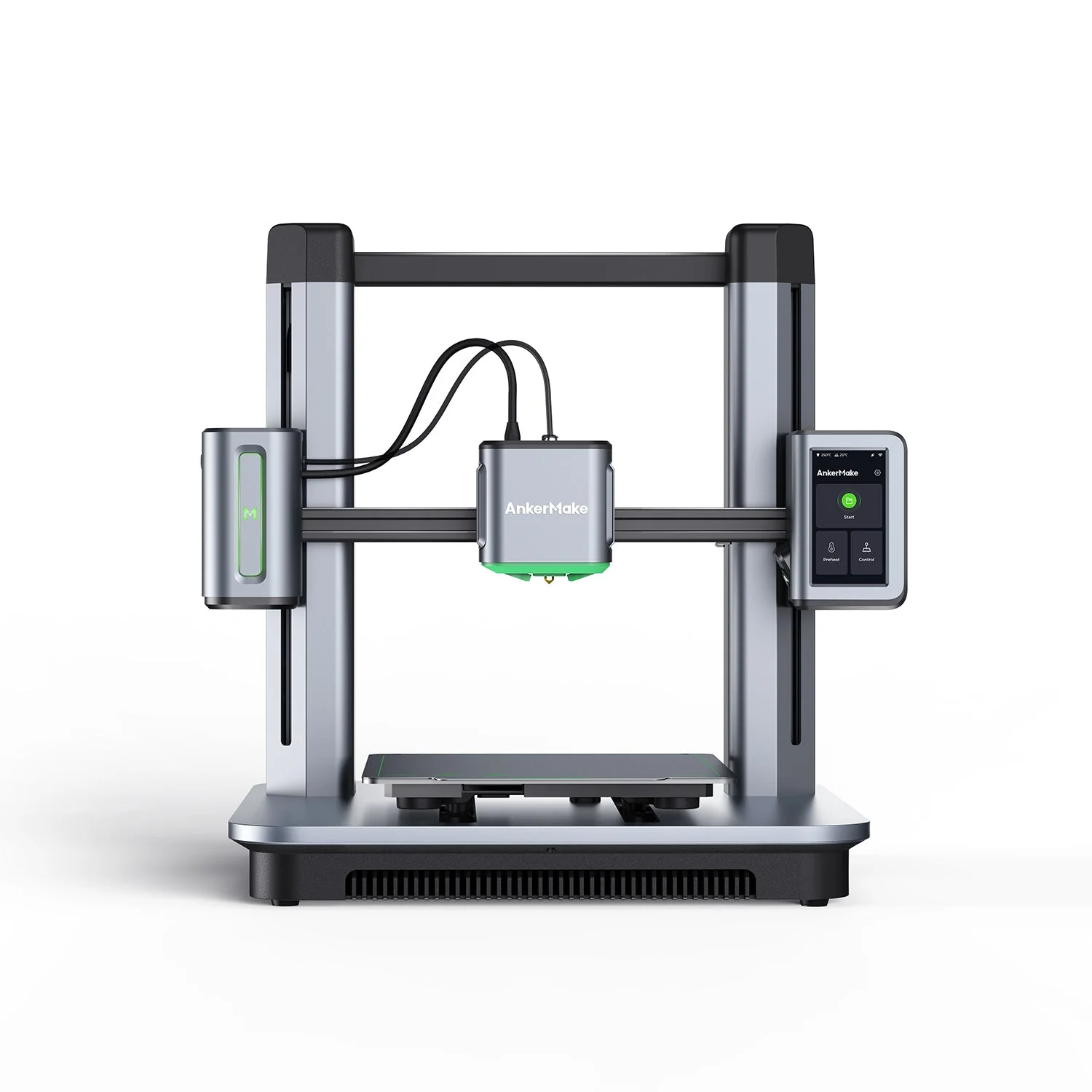Compare H2D vs M5
Comparison between the best 3D printers
Choose the best 3D printer at the best price. The cheapest 3D printers are here.
Buy a 3D printer here with 3D Fila.
 |
 |
|
| Model | H2D |
M5 |
| Printing Material | Filament | Filament |
| Buy Filament for Bambu Lab H2D | Buy Filament forAnkerMake M5 | |
| Estimated price | $1899,00 | $497,00 |
| Manufacturer | Bambu Lab | AnkerMake |
| Release Year | 2025 | 2023 |
| Print Volume [mm] | 350x320x325 | 235x235x250 |
| Printer Size [mm] | 492x514x626 | 502x438x470 |
| Weight [kg] | 42,3 | 12,6 |
| Power Loss Recovery | YES | YES |
| Enclosed printer | YES | NO |
| Bed Leveling | Automatic | Automatic |
| Filament End Sensor | YES | YES |
| Bed type | Heated | Heated |
| Power supply system | Direct Drive | Direct Drive |
| Standard nozzle | 0,4 | 0,4 |
| Maximum Nozzle Temperature [°C] | 350 | 260 |
| Maximum Bed Temperature [°C] | 120 | 100 |
| Maximum printing speed [mm/s] | 600 | 500 |
| Filament holder | YES | YES |
| Camera for supervision | YES | YES |
| Recommended filaments | PLA, PETG, ABS, ASA, TPU, PVA, Nylon (PA) | PLA, PETG, ABS |
| Recommended slicers | Bambu Studio | AnkerMake Studio (macOS, Windows), Simplify3D, Ultimaker Cura, PrusaSlicer |
| Maximum Resolution [mm] | 0,01 | 0,1 |
| Processor | ||
| Display | Touchscreen 5'' | Touchscreen 4,3'' |
| Power Supply | 350 W | |
| Connectivity | Wifi, Bambu bus, Cartão SD | Wi-Fi, USB-C, OTA Upgrade |
| Operating systems | Windows, Mac, Linux | Windows, Linux, Macbook |
| Date of registration in the system | 2025-03-31 | 2024-07-08 |
| Release date | 2025 | 2023 |
| Extra features | Bambu Labs H2D combines high-speed 3D printing with a chamber heated up to 65 °C, dual extrusion with automatic nozzle switching, an AMS for filament drying and exchange, and AI sensors that detect failures. It offers optional laser and digital cutting capabilities, features intelligent calibration through computer vision, vibration control, enhanced fire safety, and real-time camera monitoring. | The AnkerMake M5 printer stands out for its impressive print speed, reaching up to 500mm/s. It features AI print monitoring, an integrated camera for creating timelapses, auto-leveling bed with pressure sensor, direct extruder, flexible PEI-coated build plate, and Wi-Fi and USB-C connectivity. Assembly is quick and easy, and the printer is designed to deliver high print quality and ease of use. |
| Support for multiple colors and materials (AMS and CFS) | YES | NO |
Notes * |
||
| Cost-benefit | 7 / 10 | 7 / 10 |
| Hardware | 7.2 / 10 | 3.5 / 10 |
| Tela | . | . |
| Print volume | 4 / 10 | 3 / 10 |
| Performance | 5 / 10 | 4 / 10 |
Conclusion |
| In conclusion, the comparison between the Bambu Lab H2D and the AnkerMake M5 presents two distinct options catering to different user needs and budgets. The H2D, with its advanced features such as dual extrusion, AI sensors, and a significantly larger print volume, positions itself as a high-performance printer ideal for serious enthusiasts and professionals willing to invest in top-of-the-line technology. Its capabilities in handling a variety of materials, along with enhanced safety and monitoring features, make it a robust choice for complex printing tasks. On the other hand, the AnkerMake M5 offers an impressive value proposition for those seeking a more affordable entry into the world of 3D printing. With its quick assembly, user-friendly features, and high-speed printing at a lower price point, it suits hobbyists and newcomers who prioritize ease of use and cost-effectiveness. Although it lacks some of the H2D's advanced functionalities and larger build volume, it still delivers solid performance for a range of standard materials. Ultimately, the choice between these two printers will depend on individual requirements, including budget constraints, desired printing capabilities, and the volume of use. Users should weigh the benefits of advanced technology and larger capacity against the value of simplicity and affordability to determine the model that best fits their needs. |

